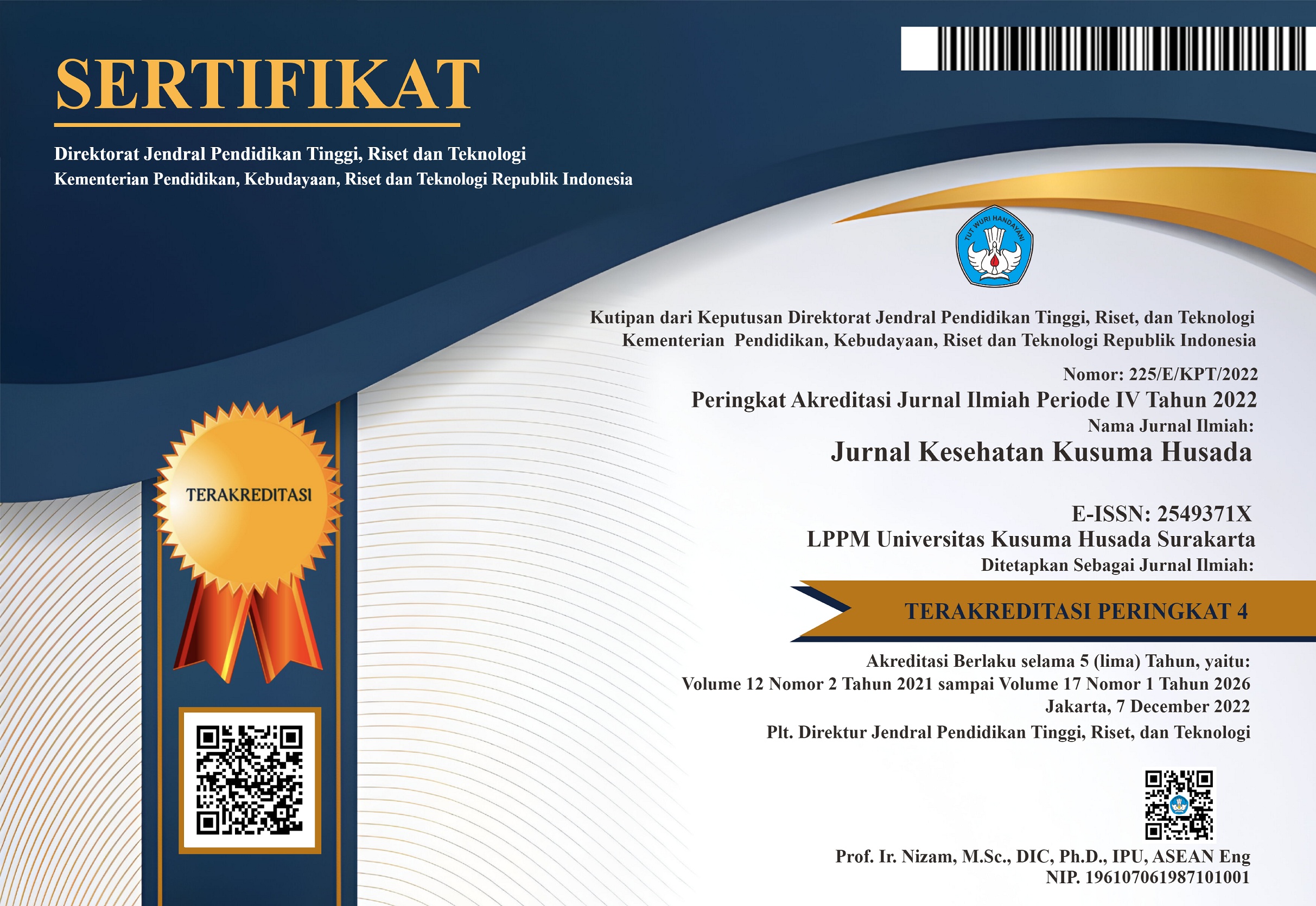GEJALA DEPRESI POSTPARTUM MEMPENGARUHI KEBERHASILAN ASI EKSKLUSIF : Sistematik Literatur Riview
DOI:
https://doi.org/10.34035/jk.v12i1.530Keywords:
Gejala Depresi Postpartum, ASI Eksklusif, Postpartum Depression Symptoms, Exclusive BreastmilkAbstract
Air Susu Ibu (ASI) merupakan satu-satunya makanan yang sempurna dan terbaik bagi bayi karena mengandung unsur-unsur gizi yang dibutuhkan untuk pertumbuhan dan perkembangan bayi yang optimal. Namun ada beberapa penyebab ibu tidak memberikan ASI secara eksklusif seperti tidak mendapatkan dukungan dari suami/keluarga, penghasilan, usia, pendidikan yang menyebabkan terjadinya depresi postpartum sehingga menghambat proses laktasi. Tujuan penelitian untuk menyimpulkan dan memeriksa literature (examine literature) apakah gejala depresi pada ibu postpartum berhubungan dengan keberhasilan pemberian ASI. Metode penelitian menggunakan studi appraisal dengan Critical Appraisal Joana Brigs Institute, dan metode sintesis menggunakan PEOS. Pencarian dibatasi pada studi yang diterbitkan dalam bahasa Inggris dan menyajikan data periode 2012-2019. Studi yang terindentifikasi ditinjau menggunakan PRISMA Flowchart. Studi dengan desain kuantitatif terkait gejala depresi postpartum mempengaruhi keberhasilan ASI eksklusif. Hasil penelitian adalah depresi postpartum diukur menggunakan EPDS (Edinburgh Postpartum Depression Scale) yang dilakukan pada ibu postpartum usia 2-6 minggu pascapersalinan. Gejala depresi dapat mempengaruhi keberhasilan pemberian ASI dan beberapa faktornya karena kurangnya dukungan emosional, pendidikan, pengetahuan, pendapatan yang rendah, dan terdapat riwayat depresi sebelumnya. Namun hal yang paling dominan terjadinya depresi postpartum yaitu kurangnya dukungan suami/keluarga. Kesimpulan penelitian ini adalah gejala depresi postpartum dapat mempengaruhi keberhasilan ASI eksklusif dikarenakan ada perubahan hormon dan mood yang terjadi pada ibu seperti tidak nafsu makan, gangguan tidur, cemas, sensitif sehingga dapat menggaggu kelancaran ASI.
Breastmilk (ASI) is the only perfect and best food for babies because it contains nutritional elements for optimal baby growth and development. However, there are several reasons why mothers do not exclusively breastfeed, such as not getting support from their husbands/families, stage, education which causes postpartum depression which hinders the lactation process. This study aims to conclude and examine the literature (examining the literature) whether the symptoms of depression in postpartum mothers are associated with breastfeeding. The method of the study using appraisal study using Joana Brigs Institute Critical Appraisal, and synthesis method using PEOS. Base search on studies published in English and present data for the period 2012-2019. Identified studies were reviewed using PRISMA Flowchart. A quantitative design study of postpartum depressive symptoms affects exclusive breastfeeding. The results showed postpartum depression was measured using the EPDS (Edinburgh Postpartum Depression Scale) which was performed on postpartum mothers aged 2-6 weeks postpartum. Depressive symptoms can affect the situation of offering breast milk and several factors due to emotional support, education, low income, a previous history of depression. But the worst thing that happens in postpartum depression is support from family. The conclusion was postpartum depressive symptoms can affect exclusive breast milk because there are hormonal and mood changes that occur in the mother such as lack of appetite, sleep disturbances, anxiety, sensitivity so that they can interfere with the smoothness of breast milk.
References
Downloads
Published
Issue
Section
License
Copyright (c) 2021 Jurnal Kesehatan Kusuma Husada

This work is licensed under a Creative Commons Attribution 4.0 International License.
The copyright of the published articles belongs to Jurnal Kesehatan Kusuma Husada.

This work is licensed under a Creative Commons Attribution 4.0 International License.
















